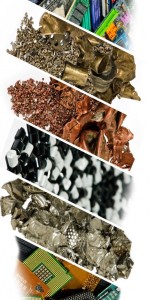Recent decades have seen the pursuit of the goal to put a stop to illegal waste export. In actual practice, however, the rules that were established for this purpose hamper the provision of the desired circular economy for secondary raw materials across borders. Therefore, the Müller-Guttenbrunn group has prepared a proposal to make recycling simpler and faster in the united Europe.
Before the European countries made the environmental safety requirements more stringent in the 1980s, waste was simply cheaply discarded in developing countries – mostly in Africa. The odyssey of “Zanoobia” gained notoriety in this respect. For 15 months, the freighter cruised with more than 2,000 tons of toxins from Italy across the oceans before its toxic cargo was discharged in an Italian port again. With the Basel Convention, an international agreement that entered into force in 1992, these practices were to be prevented.
The export of hazardous and also of unlisted wastes has since been subject to strict notification requirements. This means that the export must be approved by a competent authorities; in the country of despatch, the transiting countries as well as in the country of import. The crux of the matter is this: these days, many types of (unlisted) waste are no longer simply disposed of, but often serve as input material for the recycling into secondary raw materials. For the recycling industry these notification requirements frequently pose a seemingly insurmountable hurdle. It may thus happen that handling a simple transport of several tons of shredder residues from E-Waste for the recovery of non-ferrous metals and plastics into one of the Müller-Guttenbrunn facilities in Austria takes as long as the odyssey of “Zanoobia”.
 A Multitude of Classifications and a Jungle of Competencies
A Multitude of Classifications and a Jungle of Competencies
This is partly due to the different classifications of waste to be considered. The required determination of the type of waste can be very difficult with ambiguous results. The material is identified by a multitude of waste codes such as the European Waste Code, the Basel and OECD codes and ultimately also by national waste codes which are, of course, all structured differently with quite some room for interpretation. This it hard to classify the waste material and often the material is classified as “unlisted”. Waste is not produced to specification and the composition therefore can vary and with constituents that cannot always be predicted.
At the same time there is a fairly non-transparent jungle of competencies at the same time. Germany alone, for example, has 28 different competent authorities responsible for handling notification requests, but also other countries have a de-centralized network of competent authorities.
All Sorts of Documents are required
However, the classification of the waste component is only the first step of the notification procedure. Everything has to be very precisely documented; recovery contracts, forms, material descriptions, recycling descriptions, transport routes, insurance and much more – and all that both as originals and duplicates. That often makes for notification requests that consist of more than 100 pages of paper before everything can be submitted – and then long wait starts. The competent authority in the exporting country may take up to 30 days to process the application. Should there be any additional questions, the responses re-start a 30-day period until all questions are responded to. Only then the notification request is sent out to the country of (transit and) receipt, where a new cycle of questions and answers begins from scratch. No wonder there are cases where it takes a year before a notification is granted. All of this not only costs the recycling company and the authorities time, but also a lot of money for the necessary administrative effort. Thus, the good intention of the Basel Convention ended up as a drag on the recyclers, the producers of secondary raw materials.
The Proposal: Fast Track Notification
The simplification of the process for responsible and secondary raw material producing recycling companies in the EU is considered to be of great importance to the Müller-Guttenbrunn Group – being based in a small EU country the group relies on many imports. For this reason, a new concept called „fast track notification“ is proposed. The companies would have to be pre-notified – called pre-consent by the regulation – for their facilities which are to be supplied.
A check would establish which waste-codes are to be recycled in these facilities – so that only waste with these waste codes may be accepted. If the exporting companies for the relevant waste codes have a collection or treatment permit and wish to deliver to a pre-consented facility for these codes, there should be no need for complicated bureaucracy any longer. The centrepiece of this sequence should be an electronic data exchange between all involved competent authorities and the recycling company, thus also eliminating the accumulation of additional paperwork.
The importance is being recognised
This concept of “Fast-Track Notifications” has already met with wide acceptance and is now supported by major European waste associations. The concept was proposed for the first time in the middle of 2015 at the occasion of the presentation of the final CWIT report in Lyon by Chris Slijkhuis of the Müller-Guttenbrunn Group. Since then the concept was presented at several major conferences. “I have the feeling that even the highest officials in the EU Member States recognise that this topic is important,” Slijkhuis subsequently stated.
This simplification would also lead to freeing resources on the authorities’ side that could then be used elsewhere.
“Fast Track Notifications” would largely support the development of a true Circular Economy in the EU, as it would significantly facilitate the production of secondary raw materials.





